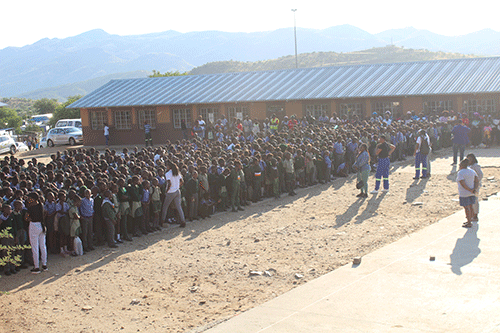Paheja Siririka
Maihapa Ndjavera
Dressed in a blue overall jacket and denim jeans, the principal of Green Leaves Primary School, Chanville Mackrill, and his teachers were ready to roll up their sleeves and build classrooms with corrugated zinc sheets and other materials they ordered to accommodate 600 learners.
The school, situated in Windhoek’s Okahandja Park informal settlement, enrolled about 2 000 learners and yesterday saw some parents being turned away, as there was no space.
“We need 19 more classrooms, and they need to be set up now. That is why we, the teachers, are wearing these overalls. We are going to construct zinc classrooms so that our children can be accommodated,” shared Mackrill, who further called on parents to assist where they can.
The standard teacher-to-learner ratio in Namibia is 1:35 for primary schools and 1:30 for secondary schools.
He said: “In some of our classes, we have more than 40 learners; that means we have an excess of over 35 learners – and because our learners are coming back, we need 19 more classrooms. Additionally, we share one of our two toilets with the nearby Mount View Secondary School”.
Nelson Tjituka, the head of the department for senior primary at Bet-El Primary School related with Mackrill on overcrowded classrooms, saying they have a full capacity of 40 learners per class.
“We are running close to 43/45 learners per class. We have communicated with some parents that their children might not benefit from going to the next grade, meaning they have to repeat –and that is pushing up the numbers; hence, we are sitting with overcrowded classrooms,” explained Tjituka.
Last minute
Tjituka said: “It’s hectic! Parents are rushing in to register their children [only] now. There is a period set by the ministry’s regional directorate for when parents register their little ones, especially from grade zero to one. But parents do not use that period, and this becomes cumbersome at the beginning of the year because they sit with unregistered children and start running around, looking for space”.
Katutura’s Theo Katjimune Primary School acting principal Prisca Makala said the day started roughly, as parents were trying to enrol their children on the last minute.
The intake reaches 1 030 yearly – and by yesterday, 1 000 of those spots had already been occupied, while space for 17 learners was open for grade zero.
“We have parents who are coming to register their children for the academic year, and there are a lot of them – but the problem is that other grades are full. We are sitting with over 40 in a classroom, and the big challenge is the chairs and desks – but we are attending to them patiently,” explained Makala.
The executive director of the education ministry, Sanet Steenkamp, said the public discourse regarding the teacher-learner ratio is known.
“By the end of the admissions that are happening, there will be a headcount, and we will see a way and assess the situation – and establish the required additional resources by Friday or latest next Wednesday.
“We should have a much better picture about the number of teachers expected,” informed Steenkamp.
She said: “Last year, the ministry provided 370 [additional] teachers to the 14 regions; we looked at a specific ratio as per their need – and not all the needs were met. What we need to do now is to remain patient. Let us see in the next week, what the situation is like”.
Steenkamp stated she is in touch with regional directors. They are aware of what is happening and will further assess the situation and see how best they can address the issue of overstepping in some regions and allocate positions for specific subjects.
“Our teachers have been dealing with various challenges. Some of them were beyond our immediate control, while others required immediate intervention. I am sure that with the classroom management skills that many teachers have honed over the years, they will be able to take care of it. We cannot compromise on education,” expressed Steenkamp, who assured the country would consider only the platoon system as a last resort.
Vulnerable learners
Makala told New Era that from the primary education grant, some stationery needs are taken care of to try and meet parents halfway.
“What we receive cannot cater to the whole school, so we are asking and pleading to the parents who can afford to buy. We have vulnerable learners and orphans, and we need to assist where we can,” pleaded Makala.
Tjtuka said the school gives parents that list but the wrong items are still bought.
“First graders, for example, may have a special kind of booklet that they have to use. Parents get coupons from shops or supermarkets and buy random books,” he stated, adding that first and third-graders have special books, and parents should take note of that.
He said when parents buy the wrong books, they are taken in – and with permission, they are re-distributed to the right groups.
Kenikejanda Kandjii, who was applying for a grade zero space for his nephew at Theo Katjimune, said last-minute action is not advised: “As parents, we tend to wait for January and pop up at schools. Nevertheless, it is not easy, but I am pleased with the service and attention we are getting here. Teachers are calm, despite the pressure, and [they are] willing to assist”.
Kandjii added education remains the key to the future, thus standing in long queues for the small ones cannot be compromised.
Another parent, Uetunanisa Katjivikua, holding his six-year-old boy, said he is a proud father, seeing his boy walking calmly in school uniform without anxiety shows he is ready for education.
Katjivikua noted he cannot ignore the fact of giving a proper foundation in education for his child.
“Let us play our role, as parents, to our kids and stop pointing fingers. We have equal responsibility as teachers,” he pointed out.


